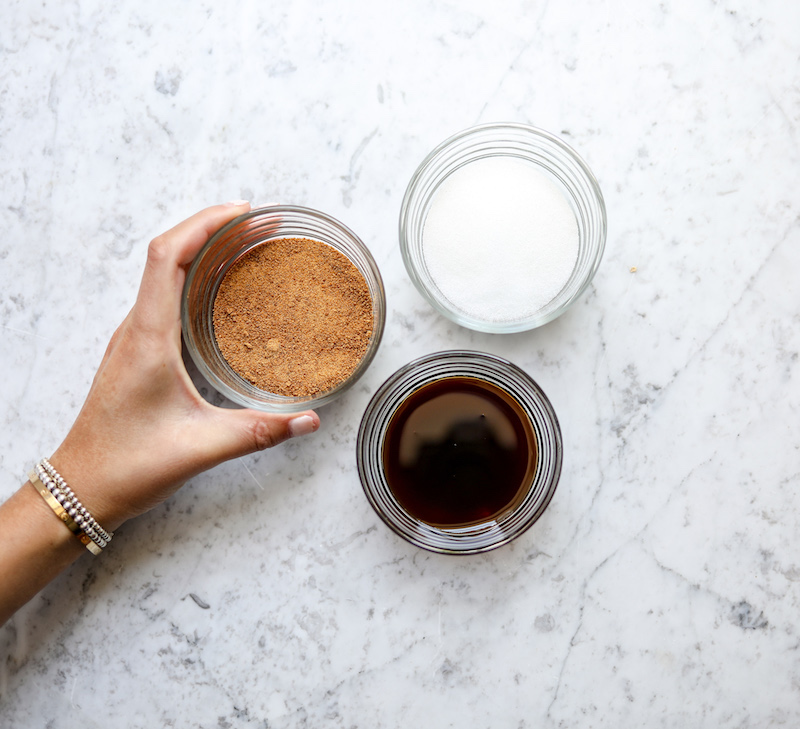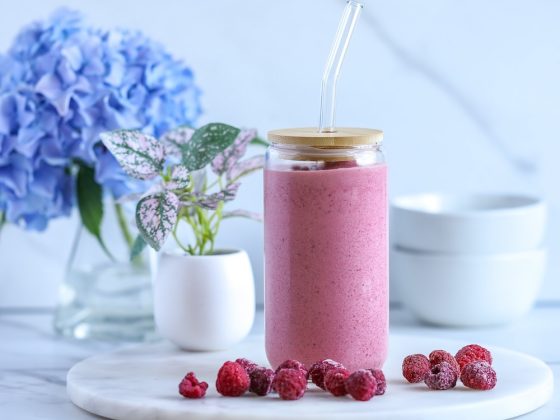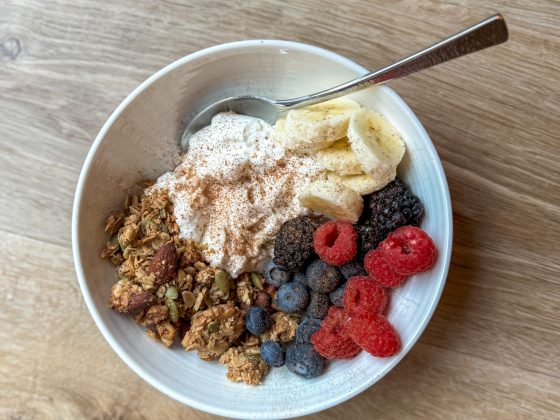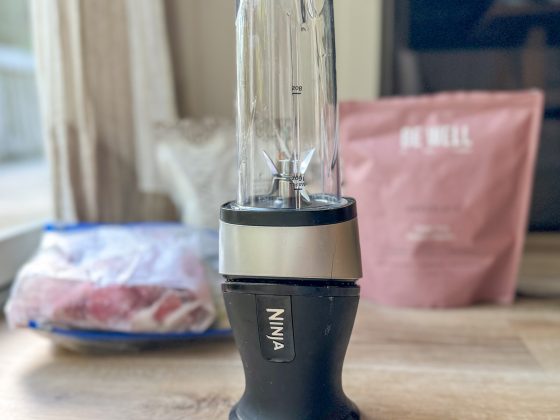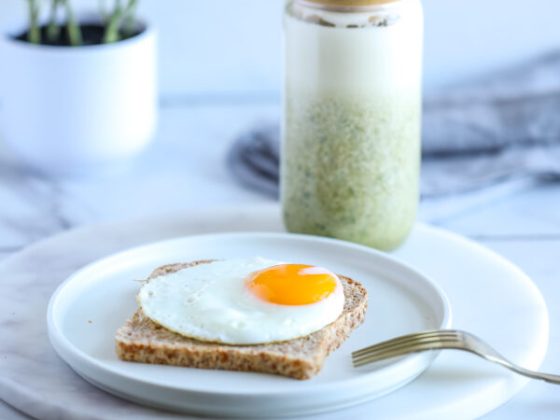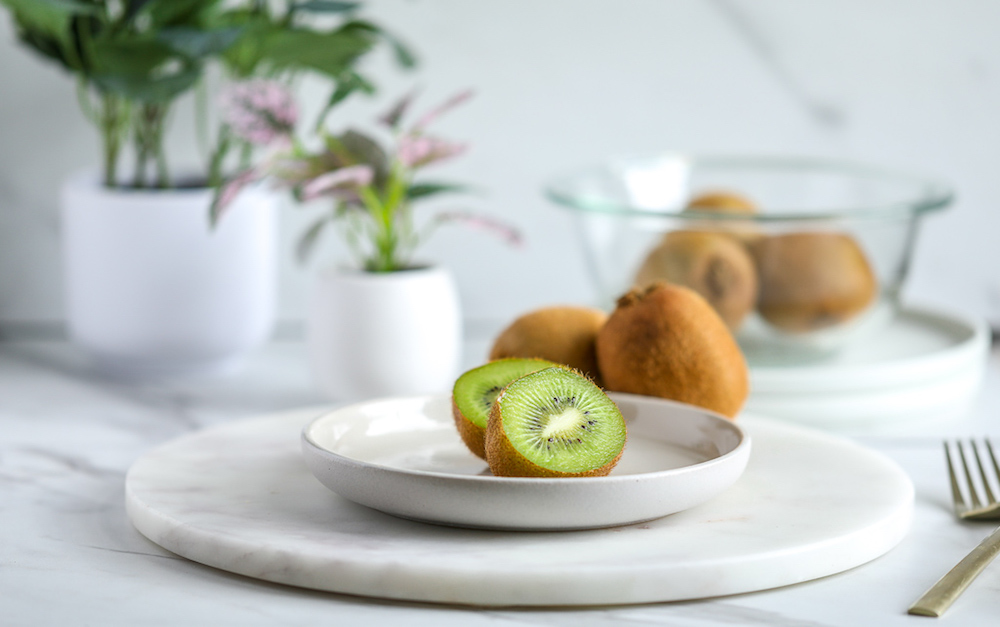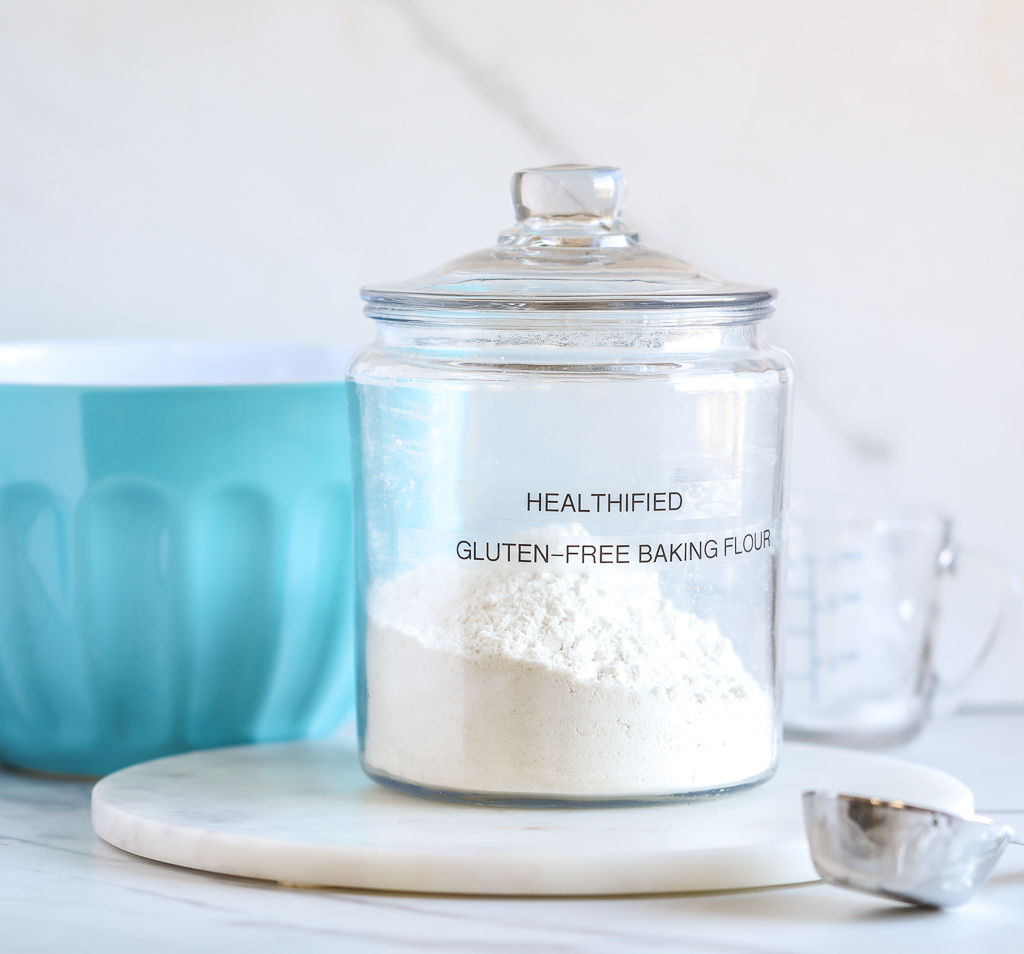By now, it is no surprise that we should be decreasing our added sugar consumption. Read the list of ingredients in any packaged food, and you will likely find sugar listed, whether as is, or disguised under a “science-y” sounding name. This is because food manufacturers are smart; they know what they are doing. They double down on the fact that many people won’t read the ingredients at all, and if they do, they may not recognize that maltodextrin for example – a polysaccharide from starches that is digestible as glucose in the body – is something to watch out for. Ingredients such as this one can impact your blood sugar just as cane sugar will. And speaking of cane sugar, this is where marketing works to pull the wool over our eyes. I remember a time when “cane sugar” was regarded as a healthier option. Your hormones surely don’t think so.
Since my early days as a health coach, I have been educating my clients on the many names of sugar. I still don’t believe all sugar is created equally, and given the fact that as humans, we are hard-wired to crave sweet foods, there are those more Healthified forms. In other words, those that sweeten and bring benefits to the table. The best of both words.
Known as “sweetening agents” in scientific terms, they are classified in various ways in research studies: “caloric” vs. “non-caloric;” “nutritive” vs. “non-nutritive.” I have done a deep dive into the studies over the years, and have become particularly been interested in the various sweeteners since bring my Gratisfied baking mixes to market. This product provides you choice in the type of sweetener you use in your homemade nutrition bars. Better yet, if you want them to completely sugar-free, you have that option as well. A long-time, loyal customer recently requested I provide a breakdown of various sweeteners to use in the baking mix, and I thought that was a great idea. As I got going, it became more of a comprehensive overview. Here is what the science says about these seven sweeteners.
Coconut nectar and coconut sugar
I have been baking with coconut sweeteners for years. Coconut sugar can replace white and brown sugars, while the nectar is a liquid (think instead of honey, maple syrup, etc). Coconut sweeteners are not only lower on the glycemic index, but also consist of vitamins and minerals. But don’t just take my word for it, consider this scientific research study, which concludes:
Vitamins C and E, minerals including zinc, iron, potassium, and phosphorus, and phytonutrients like antioxidants, flavonoids, anthocyanidins, and polyphenols, are all present in coconut sugar. Additionally, inulin comes in a substantial quantity in coconut sap sugar. It is necessary for the synthesis of short-chain fatty acids acetate, butyrate, and propionate. Coconut sugar and syrup (the latter contains dietary fiber and fermentable inulin) are truly promising functional foods and are converted into short-chain fatty acids…coconut sugar has a low GI that falls within the 35–54 range per serving. Low GI diets lower the likelihood of developing certain chronic diseases like type II diabetes. Compared to other sugars, coconut sugar has nutritional superiority.
Compared to the majority of other commercially available sugars, coconut sugar is certainly a healthy sweetener. It is processed by evaporating sap—which requires considerable labor and resources when collected from trees—that is then transported, stored, and processed. Therefore, the manufacture cost is higher than for cane sugar. People are willing to pay high prices for it given its nutritional value and low GI.
Saraiva A, Carrascosa C, Ramos F, Raheem D, Lopes M, Raposo A. Coconut Sugar: Chemical Analysis and Nutritional Profile; Health Impacts; Safety and Quality Control; Food Industry Applications. Int J Environ Res Public Health. 2023 Feb 19;20(4):3671. doi: 10.3390/ijerph20043671. PMID: 36834366; PMCID: PMC9964017.
Unfortunately, coconut nectar has been hard to find these days, and ever since I launched my Empower Bar baking mixes, I have gotten a lot of questions about where to buy it. Coconut Secret was the main brand producing it in the past, and since the company was acquired by Nutiva in 2021, they are no longer selling it. I have found one on Amazon by Wildly Organic, but it is more difficult to find in the grocery store.
Allulose
I first learned of allulose from Dr. David Perlmutter in his book Drop Acid. He argues it is one of the primary alternative sweeteners we should be using:
“Allulose is a sugar that…has little to no effect on blood glucose or insulin levels; the body absorbs allulose but does not metabolize it into glucose, so it is virtually calorie-free. New research shows that in humans, allulose has a favorable impact on blood glucose and may improve insulin sensitivity. In addition, studies reveal that allulose may exert an anti-inflammatory effect on adipocytes – fat cells – the source of inflammatory cytokines that drive metabolic syndrome…allulose is found naturally in some foods, such as figs and raisins, but you can buy it in both granulated and liquid forms online.”
Dr. David Perlmutter. Drop Acid
Allulose is what I have been loving lately, and have made a couple batches of Empower Bars using it instead of a liquid sweetener. It is only about 70% as sweet as sugar, but I prefer my baked goods more subtle in sweetness. You can find allulose in both granulated and liquid forms. It’s exciting see scientific research support the benefits of this alternative sweetener. Because allulose is unique metabolized, studies show it neither impact blood sugar levels nor negatively impacts liver health. This study also lists its benefits to human health, from reducing diabetes, to lowering postprandial glucose levels, to interacting with gut microbes resulting in reduced inflammatory symptoms.
Disclaimer: I am not encouraging you consume allulose for these health benefits, but rather if you are cooking and baking, and a recipe calls for a sweetener, allulose might be a good choice. A disadvantage is that some people experience digestive distress after consuming allulose, so listen to your body to figure out if it works for you.
Stevia
Stevia was my first sugar-free natural sweetener I incorporated into my diet when I started to live a more blood sugar balancing lifestyle. I got the drops for my morning cup of coffee, and after quickly getting over the after-taste, it is still one I use today. With a negligible calorie count combined with beneficial health properties, it has been the subject matter of many research studies.
The extract as we know it today comes from the leaves of a perennial shrub indigenous to Paraguay in South America. The plant’s properties and its derivatives (the leaves’ extract being one) has shown to have anti-inflammatory, anti-diabetic, anti-cariogenic, and antimicrobial effects among others. As mentioned above, one downside is the taste, which a lot of people get hung up on. This makes it challenging to utilize in larger doses (like baking for example). For me personally, I still prefer it in my coffee, and use a couple drops in one cup each morning.
Monk Fruit
Monk fruit, or Luo Han Guo, comes from an herbaceous perennial plant indigenous to southern parts of China, and has been cultivated there for over 200 years. It has become a popular sweetener used in the food industry in recent years due to the fact that it is roughly 300 times sweeter than sucrose, while also being more beneficial for health. It not only contains zero calories, but recent studies show monk fruit has anti-cancer, anti-diabetes, anti-inflammatory, and neuroprotective properties. It is also recognized as safe by the FDA. It comes in both liquid and granulated forms. All of these reasons embody why monk fruit is one of the main sweeteners used in all of my Gratisfied products!
Honey
Honey can be a controversial sweetener. On the surface, given its high sugar content, recommendations have been to limit its consumption. But when you peel back the layers, you realize the liquid nectar is more complex than a simple sugar syrup. In addition to the sugars, certain kinds of honey contain enzymes, vitamins, minerals, amino acids, and flavonoids. Studies even show that due to its prebiotic properties, honey is good for the gut. The bottom line is that whether or not honey has its benefits in tact depends on where it came from. The conventional honey you find on grocery store shelves may have been stripped of nutrition, so look for high quality sources. Both Manuka honey and raw honey are great options. Instead of getting yours from the grocery store, opt for the farmers market or a local vendor, who is more likely to carry the real deal.
Maple Syrup
Maple syrup primarily comes from boiling the sap of sugar maple trees. It is a natural sweetener with phenolic compounds, vitamins, minerals, making it preferable to refined forms of sugar. Specifically, it contains B vitamins, potassium, calcium, zinc and manganese, meaning it not only naturally sweeteners, but also has some nutritional benefits. Studies have shown that maple syrup is not only more beneficial for blood sugar as compared with its more refined counterparts (like corn and brown rice syrups), but also can have anti-cancer and antioxidant properties. Similar to honey, the quality of maple syrup can differ depending on the grade, where it is cultivated, and how it is processed. Certain classification systems have been put in place to distinguish various types of maple syrup. For example there are two processing grades (Grade A and Processing Grade), and four colors: Gold, Amber, Dark, Very dark. The darker syrups are known to contain more beneficial bioactive compounds and polyphenols. Inulin, a prebiotic fiber, has been found in some maple syrups, which implicates a better blood sugar balancing sweetener with benefits for digestive health.
Erythritol
Last but not least. Erythritol has been in the news of late, and I would be remiss if I didn’t address the study connecting its consumption to cardiovascular event risk. It was of particular interest to me, as I have loved learning more about keto baking, and have used granulated erythritol in many recent recipes. I have done my due diligence, reviewed the research, and spoke to professionals in the space. In conclusion, I have landed on the belief that if you are a healthy individual with no current cardiovascular issues, it is okay to eat it in moderation. Let me explain.
After reviewing the research study myself, it is important to know that the participants were mostly over the age of 60, and already had – or were at high risk for – cardiovascular disease. It is clear to me that this population should take the study seriously. I am not saying that if you don’t fall into this category, you shouldn’t take the study seriously, but it is something to note. My immediate next step was to reach out to a contact in the food industry. According to Lakanto, a company that sells natural, sugar-free sweeteners, “erythritol has 25+ years history of safe application and studes.” In a statement released to the public, Lakanto believes the erythritol study can be argued on several points:
The study represents a cohort (non-randomized) study. Results of cohort studies do not exclude bias – they are always affected by the human choice and factors specific to the group/experiment conditions, which are not related to the performance of a product being tested.
In the case of the paper, such specific conditions are:
- Age group – the study involved only patients of 63-75 age group. Nothing was studied for different age groups, no comparison made.
- Health conditions – all involved patients had cardiovascular conditions, eg, 50% of them had a history of myocardial infarction before the study and 80% were struggling from hypertension. No studies on healthy population, no comparison, no crossover studies.
- Dosage – patients were given a 30g dosage as a single administration. That does not represent real life consumption patterns.
- Product – erythritol only. No comparison with sugar or other types of sweeteners. No placebo control.
As a result, the cohort study does not represent a real clinical intervention and can be misleading due to overestimation of the product health effect due to the experiment conditions. Since the study was not targeting a healthy population, no conclusion can be made that erythritol intake causes cardiovascular diseases. Reproducibility can not be confirmed for the study either. The paper does not compare erythritol effects with sugar, which relationship with cardiovascular diseases is well known.
Lakanto lakanto.com
In response to the recent headline, the New York Times published an article explaining why the findings aren’t as grim as people are perceiving it. All of this being said, here are my personal takeaways:
- If you are over the age of 60, and already have, or are high risk for, cardiovascular disease, you should eliminate or drastically reduce erythritol and other artificial sweeteners from your diet.
- If you are a healthy individual, it is my opinion that erythritol is safe to eat in moderation. And on that note, artificial sweeteners of any kind should be moderated.
- Research studies can be a double-edged sword. Nutrition rooted in science is so important for making informed decisions; yet they can also make declarations to the general public when they are not well versed in reading scientific papers. It is therefore possible for opinions to be skewed in different directions when there are in fact caveats to consider.
Bottom Line:
As humans, we are biologically hard-wired to crave sweet foods. I love to bake, so have made it my mission and personal passion to create Healthified recipes that have both physical and emotional benefits. Sugar in some form will likely always be a part of my life. If you have a similar sweet tooth, my recipes and products are for you. You can always come back to the information in this article to make an informed choice when it comes to cooking and baking. Additionally, you could also turn to foods like dates, dark chocolate, and starchy vegetables like squash or sweet potatoes to crowd out any cravings.

